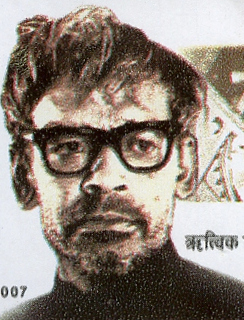
Ritwik Kumar Ghatak was an Indian film director, screenwriter, actor and playwright. Along with prominent contemporary Bengali filmmakers like Satyajit Ray, Tapan Sinha and Mrinal Sen, his cinema is primarily remembered for its meticulous depiction of social reality, partition and feminism. He won the National Film Award's Rajat Kamal Award for Best Story in 1974 for his Jukti Takko Aar Gappo and Best Director's Award from Bangladesh Cine Journalist's Association for Titash Ekti Nadir Naam. The Government of India honoured him with the Padma Shri for Arts in 1970.

Meghe Dhaka Tara is a 1960 film written and directed by Ritwik Ghatak, based on a social novel by Shaktipada Rajguru with the same title. It stars Supriya Choudhury, Anil Chatterjee, Gita Dey, Bijon Bhattacharya, Niranjan Roy, and Gyanesh Mukherjee. It was part of a trilogy consisting of Meghe Dhaka Tara (1960), Komal Gandhar (1961), and Subarnarekha (1962), all dealing with the aftermath of the Partition of Bengal during the Partition of India in 1947 and the refugees coping with it.

Shaktipada Rajguru was an Indian Bengali writer. Several of his novels have been adapted for the screen including the Ritwik Ghatak-directed Meghe Dhaka Tara and the Shakti Samanta-directed Amanush. His stories have been translated into Hindi, Tamil, and Malayalam.
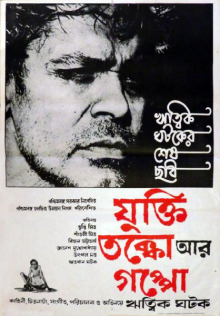
Jukti Takko Aar Gappo is a 1974 Bengali film directed by auteur of Indian cinema Ritwik Ghatak. Jukti Takko Aar Gappo was Ritwik Ghatak's last film. The film was believed to have a cinematography way ahead of its time. The film won National Film Award's Rajat Kamal Award for Best Story in 1974.

Nagarik, also spelled as Nagorik, was the first feature-length film directed by legendary Indian director Ritwik Ghatak. Completed in 1952, it preceded Satyajit Ray's Pather Panchali as perhaps the first example of an art film in Bengali cinema, but is deprived of that honor, since it was released twenty-four years later, after Ghatak's death. On 20 September 1977, it finally premiered at the New Empire theatre in Kolkata, India. Ghatak directed only eight feature films, but is generally regarded as one of the auteurs of Indian cinema and virtually unsurpassed as a creator of powerful imagery and epic style by directors such as Satyajit Ray and of transcendental power and extraordinariness by critics such as Derek Malcolm.

Subarnarekha is an Indian Bengali film directed by Ritwik Ghatak. It was produced in 1962 but not released until 1965. It is a part of the trilogy that includes Meghe Dhaka Tara (1960), Komal Gandhar (1961) and Subarnarekha (1962), all dealing with the aftermath of the Partition of India in 1947 and the refugees coping with it.
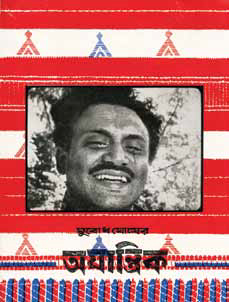
Ajantrik is a 1958 Indian Bengali film written and directed by revered parallel filmmaker Ritwik Ghatak. The film is adapted from a Bengali short story of the same name written by Subodh Ghosh.

Abhi Bhattacharya was an Indian actor of Hindi and Bengali cinema, who is most remembered for his roles in films of the 1950s and the 1960s, such as Yatrik (1952), Jagriti (1954), Anuradha (1960), Subarnarekha (1965) and Amanush 1975. In his four decade long acting career he performed in more than 150 films in Hindi and 21 in Bengali. Abhi Bhattacharya worked with eminent film directors of India such as Ritwik Ghatak, Guru Dutt, Bimal Roy and Satyen Bose.

Bari Theke Paliye is a 1959 coming-of-age Bengali film by director Ritwik Ghatak.

Komal Gandhar, also known as A Soft Note on a Sharp Scale, is a 1961 Bengali film written and directed by legendary film maker Ritwik Ghatak. The title refers to the Hindustani equivalent of "E-flat". It was part of the trilogy composed of Meghe Dhaka Tara (1960), Komal Gandhar and Subarnarekha (1962), all dealing with the aftermath of the Partition of India in 1947 and the refugees coping with it, though this was the most optimistic film of his oeuvre. The film explores three themes juxtaposed in the narrative: the dilemma of Anusuya, the lead character, the divided leadership of IPTA, and the fallout from the partition of India.

Autograph is a 2010 Indian Bengali drama film by debutant director Srijit Mukherji. The movie is a tribute to Satyajit Ray's 1966 film Nayak and yesteryear Bengali actor Uttam Kumar, who portrayed the title role in the film. This was the first collaboration between Srijit Mukherjee and Prosenjit Chatterjee. The movie is being remade in Malayalam.

Amar Lenin is a 1970 black and white documentary film directed by film director Ritwik Ghatak made for Government of West Bengal in the centenary year (1970) of the birth of Vladimir Lenin.

Ramkinkar Baij - is an incomplete personality study or documentary on sculptor Ramkinkar Baij created by legendary filmmaker Ritwik Ghatak. He started creating the film in 1975. The film was almost complete but it still remained unfinished for the death of Ritwik Ghatak.
Kato Ajanare (1959) is an unfinished Bengali drama film directed by Ritwik Ghatak. The storyline was based on a Bengali novel written by Mani Shankar Mukherjee with the same title. The film was shot on a 20-day schedule. The shooting was complete, except the court scene. The film was discontinued and abandoned for mainly financial and some other problems.
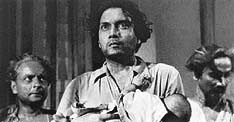
Chinnamul was a 1950 Bengali film directed by Nemai Ghosh. This was the first Indian film that dealt with the partition of India. The story revolved around a group of farmers from East Pakistan who were forced to migrate to Calcutta because of the partition of Bengal in 1947. Russian film director Vsevolod Pudovkin came to Calcutta at that time, watched this film, and being inspired, he bought the print of this film to release in Russia. The film was shown in 188 theaters in Russia.
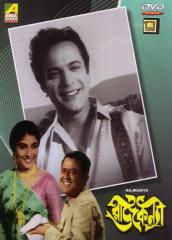
Rajkanya is a 1965 Bengali film directed by Sunil Bandyopadhyay. The movie was based on a story and screenplay by legendary film director Ritwik Ghatak. Uttam Kumar, Rina Ghosh, Bhanu Bandopadhyay, and Tarun Kumar portray the main characters.

Meghe Dhaka Tara is a 2013 Indian Bengali film directed by Kamaleswar Mukherjee and made under Shree Venkatesh Films banners. The film is inspired by the life and works of Bengali film director Ritwik Ghatak. The entire film is in black and white except the last scene which has been shot in colour. In this film Saswata Chatterjee plays the character of Nilkantha Bagchi and Ananya Chatterjee plays the role of Durga, Nilkantha's wife. The film was released on 14 June 2013. Besides giving an account of Ghatak's life, the film also depicts the socio-political environment of contemporary West Bengal during the Tebhaga and Naxalite movements.
Arup or ARUP may refer to:

Double Feluda is a 2016 Bengali language crime thriller detective film, based on the Bengali sleuth Feluda, created by the acclaimed and renowned Oscar-winning director Satyajit Ray. It is the 19th film in the Feluda series. Directed by his son Sandip Ray, the film marks the comeback of both Sabyasachi Chakraborty and Saheb Bhattacharya, with the former returning to the eponymous role of Feluda and the latter playing his sidekick. This is a sequel of Royal Bengal Rahashya (2011). The film was released on 16 December 2016 to mark the 50th anniversary of the iconic creation. The film is based on two Feluda stories - Samaddarer Chabi and Golokdham Rahasya.
















